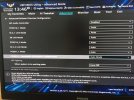Just for clarification: Those crashes only happen with an OS *installed to disk*?
Any chance that HBA doesn't run IT mode/firmware and there is some form of RAID configured with those disks? I've seen ZFS corruption with some buggy RAID-firmwares on more than one occasion.
Additionally, check the error log of those disks (
Since this seems to be some kind of repurposed gaming system: how are those SAS disks connected to the HBA?
Any chance that HBA doesn't run IT mode/firmware and there is some form of RAID configured with those disks? I've seen ZFS corruption with some buggy RAID-firmwares on more than one occasion.
Additionally, check the error log of those disks (
sg_logs --all), especially log pages 0x02-0x06, i.e. the error counter pages and non-medium error pages (=>cabling/backplane problems!!)Since this seems to be some kind of repurposed gaming system: how are those SAS disks connected to the HBA?

